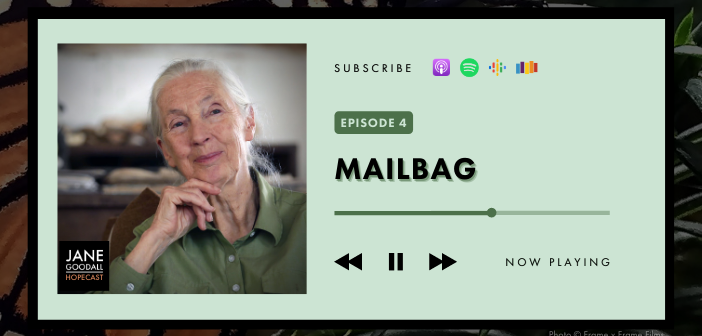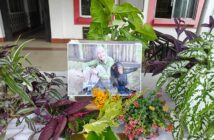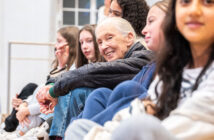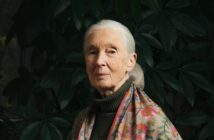FULL TRANSCRIPT
Jane Goodall 0:00
CONSERVATION CHOIR INTRO: There are so many ways we can save our planet. What is there without a hope? I just want people to find empathy for all the species we share this planet with. I have so much hope! Can nature of bounce back? Earth is pretty special because– Jane Goodall made me believe in my own power– She devoted her life to this. Together we can! Together we will! What are your greatest reasons for hope? I’m Jane Goodall and this is the Hopecast.
As you’ve probably already noticed, this episode of the Hopecast is different from the others. It’s special. That’s because this is my time to connect with all of you, our Hopecasters, who spread hope every single day. This is our very first of many mailbag episodes, each of which features the questions, concerns, and reasons for hope, submitted by you Hopecasters from all around the world. One of the things I miss the most about life before COVID is traveling the world and having the opportunity to meet so many of you. And with these precious episodes, I get to feel that sense of connection with you again. On our mailbag episodes, a member of our Hopecast team will play your beautiful and thoughtful submissions, so that I can respond to them directly. I can’t wait to hear your voices once more. This is how we grow hope together, Hopecasters. Today, I’m joined by an extraordinary Hopecaster, who’s an amazing part of this community: Executive Producer, Michelle Khouri.
Michelle Khouri 1:54
Hello, Jane.
Jane Goodall 1:57
Hello, Michelle.
Michelle Khouri 1:58
It’s very special to be here on the other side of the mic for this episode.
Jane Goodall 2:02
Well, it’s very nice that you can join me on the other side of the mic. On the other side of the world, by the way.
Michelle Khouri 2:08
On the other side of the world, on the other side of the mic, here we are. And in fact, we have a lot of different Hopecasters joining us from all corners of the world today. So this is going to be a pretty special moment. So first up, we’re going to be walking through some of the submissions from our Hopecasters, like you said earlier, and I’m so excited for you to hear this first one. It’s from Hopecaster Shubh; I hope I’m pronouncing that right. And they didn’t give us a location, but they did give us a lot of hope and energy and emotion when they submitted their clips. So I’m gonna play that for you right now. And then we’ll get your response directly to that podcaster.
Hopecaster 1 2:47
Hi Dr. Goodall, the first time I saw you in person, I had unexpected tears in my eyes, I guess it kind of made me feel like a child again, full of hope and optimism for the future. I belong to a generation of people that have grown up watching and being inspired by you and your work. And I think in turn, it’s given us a kind of reverence and sense of responsibility to do what we can for nature. And I thank you very much for that. There are so many questions I would love to ask, but I’m always curious is that now when you look back at your extensive work, and adventurous life, are there any regrets? Or is there anything you feel that you would have done differently? And if so, then what message do you have for the next generation to learn from that? Thank you very much. Looking forward to hearing more in these podcasts and Happy New Year.
Jane Goodall 3:47
Happy New Year to you. And thank you for those wonderful remarks. And you know, it’s when I get feedback like that from people like you, that gives me the energy to carry on doing what I do. Because we all need some feedback somehow. And when I look back over my life, did I make mistakes? Of course I did. But you know something? I learned from my mistakes. And I can’t really think when it comes to work with the chimpanzees, the course that my career took, I don’t think I would have done anything different. And so I always tell young people, or maybe people like you, if you make a mistake, just think well, maybe it’s taught me something, and I can move ahead knowing a little bit more about life.
Michelle Khouri 4:39
That’s beautiful. What a good question. And what a hopeful start to this conversation. And next, I know – because I’ve grown to know you throughout this process – that this is going to really warm your heart. This is a very special message from Selena Marwaha who is sending her clip from Dubai. So we’re going to hear Selena’s message now.
Hopecaster 2 5:03
I am a six year old girl from Dubai, who dreams of seeing a greener and happier planet. I feel that the earth is sad, and we need to take action, not grownups, but kids too. Dr. Jane has made me realize that I’m not too young to make a difference. I do read aloud to other kids about endangered and extinct animals, and make them see the beauty that our planet has already lost. It’s not too late. And I hope all kids join me in saving our Mother Nature.
Jane Goodall 5:49
Oh Selena, thank you for that. My goodness, I wish every six year old was just like you. But as you say, you’re encouraging all your friends, to help to save the planet, to save animals, and understand that each single one of us isn’t too young, isn’t too old to do our bit. We can all make a difference. And you know something Selena, every single one of us, every one, we can’t help making some difference every day that we live. And we get to choose, don’t we, what sort of difference we make. And you’re obviously making all the right choices. And I hope you know about our youth program Roots and Shoots. And if you don’t, well, you’ll have to learn about it because I need people like you. So thank you.
Michelle Khouri 6:49
Our next clip is from Eiry Rees Thomas. And she says something that’s pretty related to Selena and her message. So let’s hear from Eiry now.
Hopecaster 3 7:02
Thank you for generating hope at this crucial time. As an author, I believe that educating children about the issues being discussed is crucial. However, a concern that I believe requires consideration is that of eco-anxiety, especially among young learners. Well-researched, age-appropriate, and engaging content calls for collaborative input amongst agencies to this end, thank you.
Jane Goodall 7:36
Well, of course, I couldn’t agree with you more. Educating young people, that I’m spending at least half my time doing, through our Roots and Shoots program, and giving young people, first of all, good information, and then encouraging them to do their bit, listening to them, encouraging them to ask questions, trying to answer them honestly, telling them you don’t know if you don’t know the answer to what they are asking. And that makes them feel kind of special. And it encourages them, I think, to go on, to be curious, to go on learning and to become citizens who will help to make this a better world. So thank you for your comment, Eiry.
Michelle Khouri 8:25
To Eiry’s point, you know, how does someone like Selena, continue on spreading awareness and making change for our planet without absorbing the anxiety that can so often come from the realization that our planet is in trouble?
Jane Goodall 8:42
Well, the message that I give people is, “Okay, if you’re thoughtful, and you know what’s going on, and you read all the doom and gloom – and there is a lot of doom and gloom – but the only way to stop being depressed, and miserable, and giving up, is to take action. And whether you’re a child joining Roots and Shoots, whether you’re an adult, joining some organization in your community, doing something, seeing that in doing you make a difference, knowing that all around the planet, other people like you, making a difference. And I think one big mistake is this saying, “think globally, act locally.” But if we think globally, it tends to be very depressing. I get depressed, if I sit for 10 minutes and think about all the bad things around the world. But if you do something, you take action with your friends, with your community, and you say, “Yes, I have, I have made a difference. We have made a difference. We cleared this stream. We picked up the litter,” then you realize that other people like you are doing the same sort of thing all around the world. Then you dare think globally. So twist that saying around: act locally, and that gives you the energy to think globally. And that gives you hope.
Michelle Khouri 10:12
So it sounds like channeling that anxiety into action is of utmost importance, but also thinking locally because the effects are being seen on very local levels, the effects of our planet are no longer just a global abstract element. We’re seeing that in our day to day lives. And that is a good segue into Ricardo, who submitted his clip from Austria. So let’s listen to what Ricardo has to say for you.
Hopecaster 4 10:41
Hi, Jane, my name is Ricardo and I’m from Austria. My greatest reason for hope is your work and that you inspire so many people around this earth to live a more sustainable life. I want to become a teacher in geography. So my question is, what do you think is the most important topic when it comes to environmentalism? And what do you think is the most efficient way to inspire not only my students, but also people around me about this topic?
Jane Goodall 11:14
Well, Ricardo, thanks for that question. And, you know, the way that I like to give messages to people, is to tell stories, because supposing some of your friends or your students, maybe they don’t believe in climate change, or they don’t believe that we can make a difference. They think it’s too late, that we’ve gone so far in our destruction and the climate crisis that we’re doomed. There’s a lot of people like that. So if you can tell stories, and what I’m always saying is, collect up all the good news stories around the world, you find them out there on the internet, and social media. There is so much wonderful stuff going on around the world. And give that to your students, tell them to search and see what they can find. And then share it. All the environments that are being restored, all the animals who are being saved. All the cruelty that’s been addressed, people are really doing the most amazing things. And that’s what we need to share, not just all the things that have gone wrong.
Michelle Khouri 12:30
And now we have a clip from Maria Valencia, who is from my home country of Colombia, and she has something very powerful to tell you.
Hopecaster 4 12:43
Some weeks ago, while working with an indigenous leader from the Amazon forest in Colombia, I heard him saying that to do his work, first, he needed to do some thinking and some heartening. Heartening means thinking with the heart. Never before I have heard that expression, but I think it resumes what is needed to save the planet, as input, We need more heartening to connect, to reflect, to love, and protect, we still have a chance to do. I hope we take t.
Jane Goodall 13:16
Well, Maria, you’re so absolutely right. And I’m always saying – it’s one of the things I say most often – that we have this wonderful intellect, we’re the most intellectual creature on the planet. But our intellect without our heart doesn’t work. It can lead us down dark alleyways, it can lead us into creating nuclear weapons, and other technology that is harmful, like genetically modified crops and pesticides and herbicides that are poison. But I believe that we can only achieve our true human potential when head and heart work together. And so what you’ve just said is so absolutely right.
Michelle Khouri 14:07
That’s beautiful. Thank you so much to everyone who submitted clips. Thank you to the Hopecasters who are constantly supporting the production and also, you know, showering us with questions and reactions from their heart. So that is it. What did you think about the first mailbag episode Jane?
Jane Goodall 14:25
I was absolutely fascinated. I didn’t actually know quite what to expect. And it was such a wonderful mixture of people and ages and countries. Again, it’s these kinds of things that makes what we do worthwhile, isn’t it? You must feel the same.
Michelle Khouri 14:42
Oh, I absolutely do. It’s an honor to be a part of this and to get to hear your hopeful calls to action on an ongoing basis. I am now vegetarian since working on this production, which Maria Valencia will know for a Columbian is a big deal. So yeah, it’s it’s a it’s an incredible honor. And, you know, it’s especially exciting to see Hopecasters, like you said of every age and from around the world, join this community. You can go to Janegoodall.org/hopecasts to join us as part of this global community. And of course, submit your own clips because you know, I’m excited. I don’t know about you, Jane, but I’m excited to hear more from this community.
Jane Goodall 15:28
Oh, yes, I’m dying to hear more from the community. But maybe there’s some criticisms too, and I’d welcome them because we can always do better, can’t we?.
Michelle Khouri 15:39
Absolutely. That was a very Dr. Jane thing to say. It’s one of the things I admire about you the most. Okay, so that’s it. Our mailbag is currently closed for the day and we will be back with more very soon.
Jane Goodall 15:53
CREDITS: Feel hopeful and inspired to act with the Jane Goodall Hopecast by subscribing on Apple Podcasts, Spotify, Stitcher, Google Podcasts, and anywhere podcasts are found. I’m your host, Jane Goodall. The Jane Goodall Hopecast is produced by the Jane Goodall Institute. Our production partner is FRQNCY Media. Michelle Khouri is our executive producer, Enna Garkusha is our producer, and Matthew Ernest-Filler is our editor and sound designer. Our music is composed and performed by Ruth Mendelssohn with additional violin tracks from Angie Shear. Sound design and music composition for the Conservation Chorus is by Matthew Ernest-Filler.

The Jane Goodall Institute is a global community conservation organization that advances the vision and work of Dr. Jane Goodall. By protecting chimpanzees and inspiring people to conserve the natural world we all share, we improve the lives of people, animals and the environment. Everything is connected—everyone can make a difference.









